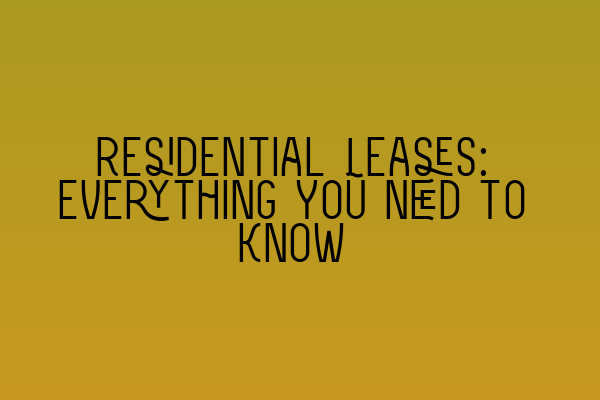Residential Leases: Everything You Need to Know
Welcome to our comprehensive guide on residential leases. Whether you’re a tenant, landlord, or a legal professional, understanding the intricacies of residential leases is crucial. In this article, we will cover everything you need to know about residential leases, from the basics to the finer details.
What is a Residential Lease?
A residential lease is a legally binding document that outlines the terms and conditions of a rental agreement between a landlord and a tenant for a residential property. It establishes the rights and responsibilities of both parties during the tenancy period.
When entering into a residential lease, it’s important to carefully review all the clauses and ensure that you fully understand your obligations as a tenant or a landlord.
The Key Elements of a Residential Lease
A residential lease typically includes the following key elements:
- Parties involved: The lease should clearly identify both the landlord and the tenant, including their full legal names and contact information.
- Term: The lease specifies the duration of the tenancy, including the start and end dates. It may also provide options for renewal.
- Rent: The lease outlines the amount of rent, the due date, and acceptable payment methods. It may also mention late payment fees or penalties.
- Security deposit: Details regarding the security deposit, including the amount, any restrictions on its use, and the conditions for its return at the end of the tenancy, should be clearly stated.
- Property description: The lease should include a thorough description of the leased property, including its address, size, and any furniture or appliances included.
- Occupancy: The lease specifies who is allowed to occupy the property, whether it’s limited to the tenant or permits additional occupants.
- Repairs and maintenance: The lease should outline the responsibilities of both the landlord and the tenant regarding repairs and maintenance of the property.
- Termination: The circumstances under which either party can terminate the lease before its expiration should be clearly stated.
- Rules and regulations: Any specific rules and regulations regarding the use of the property, such as pet policies or noise restrictions, should be clearly outlined.
The Importance of Seeking Legal Advice
Given the legal complexities involved in residential leases, it is highly advisable to seek legal advice before signing any lease agreement. A qualified property law solicitor can review the terms of the lease and ensure that your rights are adequately protected.
At SQE Property Law & Land Law, our team of experienced solicitors specializes in property law and can provide you with expert advice on residential leases.
Residential leases are subject to various laws, regulations, and local authorities’ guidelines. An experienced solicitor can help clarify any legal jargon, identify unfair clauses, and ensure that the lease is compliant with all relevant regulations.
By seeking legal advice, you can avoid potential pitfalls and ensure that your rights and interests are protected throughout the tenancy.
Common Issues with Residential Leases
Residential leases can give rise to a range of potential issues that tenants and landlords should be aware of. Some common issues include:
- Repair disputes: Disagreements may arise regarding the responsibility for repairs and the extent of damage considered fair wear and tear.
- Deposit disputes: Issues related to the return of the security deposit can occur if the tenant believes they are entitled to a full refund but the landlord disagrees.
- Evictions and illegal eviction: Understanding the proper legal procedures for eviction is crucial for both landlords and tenants.
- Rent increases: Tenants should be aware of their rights regarding rent increases, ensuring they are in line with statutory regulations.
- Disputes over property condition: Tenants may dispute the state of the property at the beginning or end of the tenancy.
If you encounter any of these issues, it is highly recommended to seek legal advice to resolve them promptly and in accordance with the law.
Related Articles:
To further expand your knowledge on related legal topics, we recommend reading the following articles:
- SQE 1 Practice Exam Questions
- SQE 1 Practice Mocks FLK1 FLK2
- SQE 2 Preparation Courses
- SQE 1 Preparation Courses
- SRA SQE Exam Dates
These articles provide valuable insights into various legal topics, including exam preparation and important dates for aspiring legal professionals.
Conclusion
Residential leases play a crucial role in defining the rights and responsibilities of both tenants and landlords. Understanding the key elements of a lease, seeking legal advice, and being aware of common issues can help prevent disputes and ensure a smooth tenancy.
At SQE Property Law & Land Law, we are dedicated to providing expert legal advice on residential leases and other property law matters. Contact us today for professional assistance in navigating the intricacies of residential leases.
